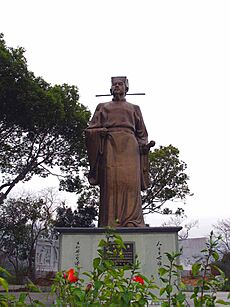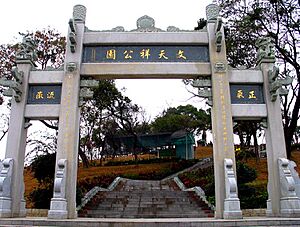Wen Tianxiang facts for kids
Quick facts for kids
Duke of Xin
Wen Tianxiang
文天祥 |
|
|---|---|
| Grand Chancellor of the Song dynasty | |
| In office 1275–1278 Serving with Chen Yizhong (1275–1276)
|
|
| Monarch | Emperor Gong Emperor Duanzong Zhao Bing |
| Preceded by | Jia Sidao |
| Succeeded by | Lu Xiufu |
| Personal details | |
| Born |
Wen Yunsun (文雲孫)
6 June 1236 Luling, Jiangnan West Circuit, Song China (present-day Ji'an, Jiangxi) |
| Died | 9 January 1283 (aged 46) Dadu, Yuan China (present-day Beijing) |

Wen Tianxiang (Chinese: 文天祥; pinyin: Wén Tiānxiáng; June 6, 1236 – January 9, 1283) was a brave Chinese poet and government leader. He lived during the final years of the Southern Song dynasty. He was also known by his noble title, Duke of Xin.
Wen Tianxiang is famous for standing up to Kublai Khan and his Mongol army. He refused to give up, even after being captured. He is seen as a hero in China, symbolizing patriotism and fighting for what is right. He is one of the 'Three Loyal Princes of the Song', along with Lu Xiufu and Zhang Shijie.
Wen Tianxiang's Early Life and Career
Wen Tianxiang was born on June 6, 1236, in Luling, which is now Ji'an in Jiangxi Province. He was very smart from a young age. At 18, he did very well in his local exams.
Two years later, he took part in important exams in the capital city. Emperor Lizong himself gave Wen Tianxiang the top rank. After this, Wen Tianxiang took on several important jobs in the Song government. He worked in the Justice Ministry and became the Prefect of Ganzhou.
Standing Up to Corruption
Wen Tianxiang often disagreed with a powerful but corrupt official named Jia Sidao. Jia Sidao wanted to make peace with the Mongols, but Wen Tianxiang believed they should keep fighting. Wen even asked for a corrupt official to be punished for suggesting they run away from the capital. Because of these disagreements, Wen Tianxiang was removed from his job and had to retire early when he was 37.
Fighting the Mongol Invasion
Later, the war against the Mongols got much worse. Wen Tianxiang was called back to serve as the Prefect of Ganzhou again. He quickly gathered local people to form an army. He was then sent to defend the area of Pingjiang, which is now in Suzhou.
Defending the Song Dynasty
In 1275, Mongol troops, led by Bayan, attacked the Jiangsu and Jiejiang regions. The Mongol forces moved quickly past Pingjiang and headed straight for the area known as Yuhang District. Wen Tianxiang rushed to Yuhang, but it was too late. His old base in Pingjiang was also quickly taken by the Mongols.
Wen and his troops then went back to Lin'an, the capital. He and Zhang Shijie wanted to keep fighting. However, other officials, like Chancellor Chen Yizhong, disagreed. Many Song officials had already run away, and most others wanted peace. Wen Tianxiang was then chosen to lead a group to ask the Mongols for peace.
A Bold Stand for Peace
In 1276, Wen Tianxiang met with Bayan, the Mongol leader. He did not ask for surrender as he was told. Instead, he bravely questioned Bayan's plans. He demanded that the Mongol troops go back to their own areas. He suggested that the Song dynasty would pay tribute, meaning they would give gifts or money to the Mongols.
Wen Tianxiang told Bayan that if the Mongols tried to destroy the Song dynasty, it would be a very difficult fight for them. He warned that their victory was not guaranteed.
Capture and Escape
Bayan saw that Wen Tianxiang would not surrender. So, he arrested Wen at the Mongol camp. Wen Tianxiang could only watch as the Empress Dowager and other Song officials finally surrendered.
However, Wen managed to escape from the Mongol camp. He went to Yang province, but the local leader there thought he was a Mongol spy. So, Wen traveled further south. He finally met up with Zhang Shijie and Chen Yizhong in Fuzhou. They were with the new young emperor, Emperor Duanzong.
After talking, Wen Tianxiang went to Nanjian province to gather more troops. He then marched to Jiangxi. Wen won a few battles, but he was eventually surrounded by Mongol forces led by Zhang Hongfan. He was captured in 1278.
Imprisonment and Loyalty
Wen Tianxiang was treated well by Zhang Hongfan. He was offered an important job in the Mongol government if he surrendered, but Wen refused.
Later, the Song resistance was completely defeated at the Battle of Yamen in 1279. Zhang Hongfan offered Wen the same deal again, saying that the Song dynasty was gone, so Wen was no longer bound to it. Wen still refused. He said, "I was a government leader of the Song but failed to save the country. I should be punished, why should I try to save my life now?"
Zhang had no choice but to send Wen to Dadu, the Mongol capital. Wen was put in a military prison.
Poems of Defiance
While in prison, Wen Tianxiang wrote famous poems. These included "Song of Righteousness" and "Crossing the Lingding Sea." In "Crossing the Lingding Sea," he wrote powerful lines showing his defiance:
人生自古誰無死
留取丹心照汗青。
Humans, since ancient times, have all faced death;
Let our loyal hearts shine in the pages of history.
The Mongol court still hoped to convince Wen Tianxiang to join them. They sent a former Song official, Liu Mengyan, to see him. Wen Tianxiang was very angry and scolded Liu. They even sent the former Emperor Gong of Song to persuade Wen, but Wen simply told him to go back to the palace. His own brother, Wen Pi, was also sent, but Wen Tianxiang said, "We have the same parents but do not serve under the same sky!"
Wen Tianxiang also received letters from his daughter. She told him that his whole family was held captive by the Mongols. Wen replied, "I have received the letter, my soul hurts so much. Everyone has family, but in this situation, I can only choose death. There is no other way."
Final Refusal and Execution
In 1283, Wen Tianxiang was brought before Kublai Khan. He bowed his head slightly but refused to bow down completely as a servant of the Mongols. Kublai Khan respected Wen and again offered him an important position.
Wen repeated his refusal, saying, "I am the Song's leader. I cannot serve another dynasty! I can only accept death. If not, I cannot face the heroes who died for our country. I only want to die, I have nothing more to say."
Around this time, a rebellion started, and the rebels said they would attack Dadu to rescue Wen Tianxiang. Kublai Khan then had no choice but to order Wen Tianxiang's execution.
It is said that after Wen's death, people found a poem he had written:
|
Wen Tianxiang's Family and Legacy
Wen Tianxiang adopted his younger brother's three sons because his own two sons died young.
Today, there are at least six branches of the Wen family. They live in provinces like Jiangxi, Hunan, Hainan, Guangdong, and Fujian. Many also live in Hong Kong and other countries. In Hong Kong, the family name is pronounced "Man." The "Man" clan is one of the original founding families in the history of Hong Kong.
Famous people like the Ming dynasty painter Wen Zhengming and Mao Zedong's mother, Wen Qimei, are also part of the Wen family.
Monuments Honoring Wen Tianxiang
Many places honor Wen Tianxiang for his bravery and loyalty.
Jiangxi Monuments
In Wen Tianxiang's hometown of Ji'an, Jiangxi, there is a special mausoleum (a grand tomb) for him. The Wen Family Ancestral Temple in Futian has displays of paintings, calligraphy, and even old army uniforms believed to be from Wen. His mausoleum is located in Wohushan.
Beijing Memorial
The Memorial to Prime Minister Wen Tianxiang was built in 1376. It is in Beijing, near where he was executed. The main hall of the memorial has words carved into its columns that praise him as a top scholar, prime minister, and loyal subject.
Guangdong Monuments
In Gurao Township, Shantou City, Guangdong, there is the "Golden Marshal's Cemetery." This cemetery remembers the heroes who fought against the Mongols. Many stories about Wen Tianxiang are told in this area. It is said that he gathered an army here to fight the Mongols. There are also nine Song tombs in the area.
Every year, the Gurao Festival is held to remember Marshal General Wen Tianxiang. During this festival, villages are decorated, and people perform folk art in the streets.
Taiwan Memorials
In the late 1950s, a place in Taroko National Park in Taiwan was renamed "Tianxiang" to remember Wen Tianxiang. Tianxiang is now a popular resort area.
Also, three streets in Taiwan are named "Tianxiang Road" after him. One is in Taipei, another in Sanmin District, Kaohsiung, and a third in Hualien County.
Hong Kong Memorials
The San Tin area in Hong Kong is home to many villagers with the surname "Man," which is the Cantonese pronunciation of "Wen." These villagers trace their family history back to Wen Tianxiang's cousin, Man Tin-Sui, who was also a Song general.
The Man Tin Cheung Memorial Park and the "Man" ancestral hall (Tai Fu Tai Mansion) in San Tin are important historical sites in Hong Kong.
See also
- History of the Song dynasty
- List of Chinese people
- Grand chancellor (China)
- Yue Fei
- Lu Xiufu
- Zhang Shijie
 | James Van Der Zee |
 | Alma Thomas |
 | Ellis Wilson |
 | Margaret Taylor-Burroughs |


